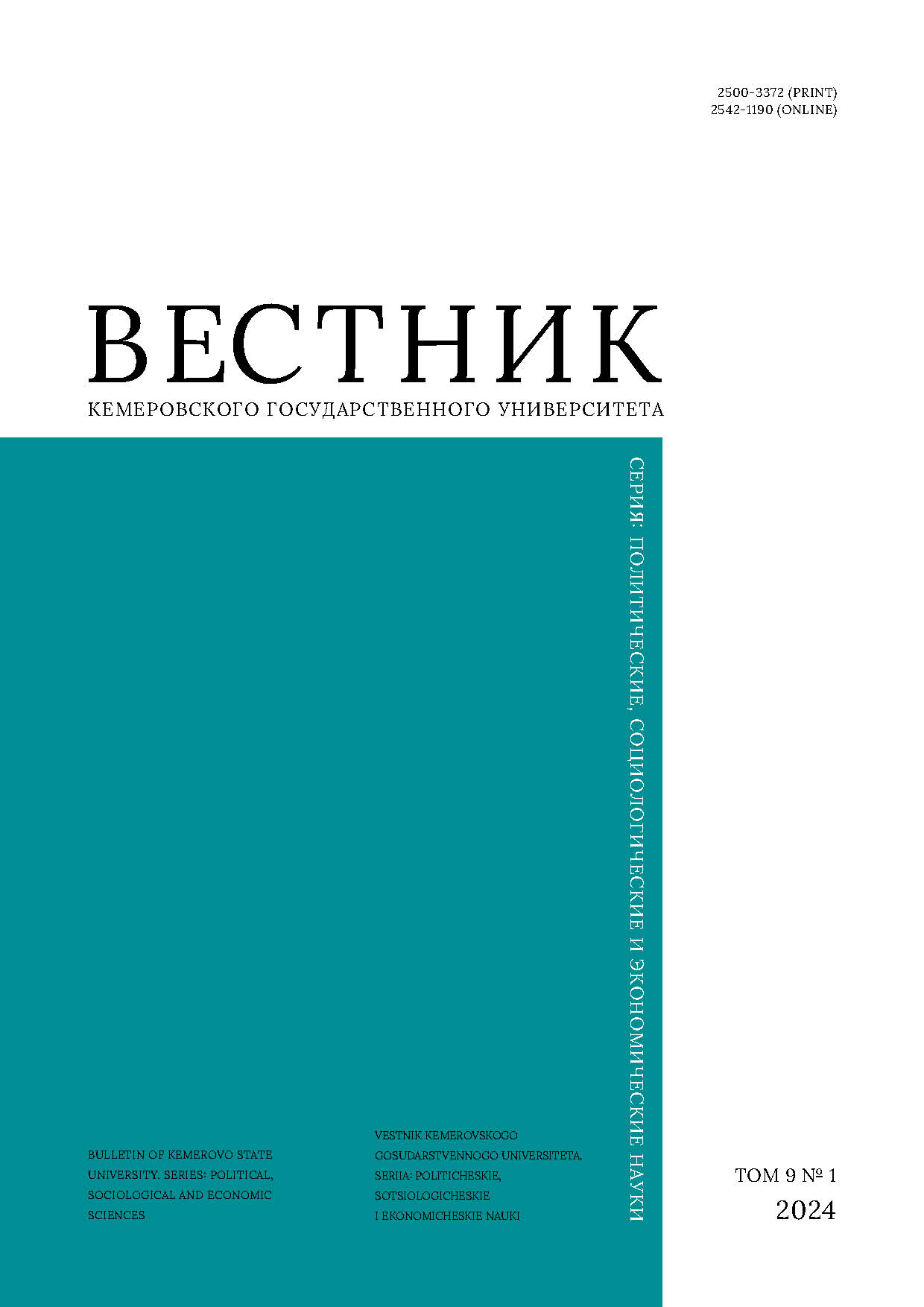Moscow, Russian Federation
Moscow, Russian Federation
Moscow, Russian Federation
Aggressive and volatile business environment determines the need to study and use innovative and progressive management paradigms that are able to ensure the competitiveness of enterprises in target markets. The subject of the study is a set of theoretical and applied principles for evaluating the effectiveness of economic entity’s business processes based on a system of certain indicators. The purpose of the study is to develop a methodology for evaluating the effectiveness of enterprise’s business processes based on the SMART approach. The authors present their vision of the groups of indicators that can be used to determine the effectiveness of business processes. The study uses a SMART approach to setting goals, which helps to correctly formulate the desired result and provides an understanding of the direction. The authors propose an approach to evaluating the business processes’ effectiveness based on six criteria: process efficiency, efficiency of providing the necessary resources, product cost, resource productivity, length of one technological cycle, adaptability of the process. Based on the synthesis of concepts such as the balanced scorecard, functional and cost analysis, and key success factors the authors create an original model for evaluating the effectiveness of business processes.
performance indicator, business process, SMART approach, evaluation, function cost analysis, balanced scorecard
1. Zuhaira B., Ahmad N. Business process modeling, implementation, analysis, and management: the case of business process management tools. Business Process Management Journal, 2021, 27(1): 145-183. https://doi.org/10.1108/BPMJ-06-2018-0168 EDN: https://elibrary.ru/MTKWOB
2. Dewi K. C., Ayuni N. W. D. Business process re-enginering of tourism e-marketplace by engaging government, small medium enterprises and tourists. Bulletin of Electrical Engineering and Informatics, 2021, 10(5): 2866-2874. https://doi.org/10.11591/eei.v10i5.3159
3. Mendes T., Santos S. A Procedural approach for evaluating the performance of business processes based on a model of quantative and qualitative measurements. Enterprise Information Systems: Proc. 18th Intern. Conf. on Enterprise Information Systems, Rome, 25-28 Apr 2016. Cham: Springer, 2017, 515-534. https://doi.org/10.1007/978-3-319-62386-3_23
4. Wang M., Wang H. From process logic to business logic - a cognitive approach to business process management. Information & Management, 2006, 43(2): 179-193. https://doi.org/10.1016/j.im.2005.06.001
5. Hung R. Y.-Y. Business process management as competitive advantage: a review and empirical study. Total quality management & business excellence, 2006, 17(1): 21-40. https://doi.org/10.1080/14783360500249836
6. Gupta J., Chaturvedi S., Prasad R., Ananthi N. Principles and practice of management. Bhopal: AG publishing house (AGPH Books), 217.
7. Draheim D. Business process technology: a unified view on business processes, workflows and enterprise applications. Heidelberg: Springer Berlin, 2014, 306. https://doi.org/10.1007/978-3-642-01588-5
8. Lederer M., Schott P., Huber S., Kurz M. Strategic business process analysis: a procedure model to align business strategy with business process analysis methods. S-BPM ONE - Running Processes: Proc. 5th Intern. Conf. on Subject-Oriented Business Process Management, Deggendorf, 11-12 Mar 2013. Heidelberg: Springer Berlin, 2013, 247-263. https://doi.org/10.1007/978-3-642-36754-0_16
9. Jeston J. Business process management. Practical guidelines to successful implementations. London: Routledge, 2014, 688. https://doi.org/10.4324/9780203081327
10. Santos H. M., Alves C. F., Valença G. A., Santana A. F. Critical success factors of BPM initiatives in Brazilian public organizations. Innovation Vision 2020: Sustainable growth, Entrepreneurship, and Economic Development: Proc. 19th Intern. Business Information Management Association Conf., Barcelona, 12-13 Nov 2012. Barcelona: IBIMA, 2012, 1806-1816.
11. Bilalova I. M., Suleimanova D. B. The problems of assessing the effectiveness of business processes and the ways of their resolving. Fundamental research, 2017, (5): 131-136. (In Russ.) https://www.elibrary.ru/yrpijv
12. Trkman P. The critical success factors of business process management. International Journal of Information Management, 2010, 30(2): 125-134. https://doi.org/10.1016/j.ijinfomgt.2009.07.003
13. Powell S. G., Schwaninger M., Trimble C. Measurement and control of business processes. System Dynamics Review, 2001, 17(1): 63-91. https://doi.org/10.1002/sdr.206
14. Del-Río-Ortega A., Resinas M., Ruiz-Cortés A. Defining process performance indicators: an ontological approach. On the Move to Meaningful Internet Systems: Proc. OTM Confederated Intern. Conf., Hersonissos, 25-29 Oct 2010. Heidelberg: Springer Berlin, pt. 1, 555-572. https://doi.org/10.1007/978-3-642-16934-2_41
15. Doran G. T. There’s a S.M.A.R.T. way to write management’s goals and objectives. Management Review, 1981, 70(11): 35-36.
16. Dumas M., La Rosa M., Mendling J., Reijers H. A. Fundamentals of business process management. Heidelberg: Springer Berlin, 2018, 527. https://doi.org/10.1007/978-3-662-56509-4 EDN: https://elibrary.ru/VFXQHL
17. Van Looy A., Shafagatova A. Business process performance measurement: a structured literature review of indicators, measures and metrics. SpringerPlus, 2016, 5(1). https://doi.org/10.1186/s40064-016-3498-1 EDN: https://elibrary.ru/OPQOGM
18. Brin P., Prokhorenko O., Nehme M., Trabulsi H. Strategic contribution of a business process to company’s performance. Journal of Information Technology Management, 2020, 12(3): 82-99. https://doi.org/10.22059/jitm.2020.76296 EDN: https://elibrary.ru/GJMSKR
19. Pourbafrani M., Gharbi F., Van der Aalst W. M. P. A tool for business processes diagnostics. Service-Oriented Computing - ICSOC 2022 Workshops: Proc. Intern. Conf. on Service-Oriented Computing, Sevilla, 29 Nov - 2 Dec 2022. Cham: Springer, 350-354. https://doi.org/10.1007/978-3-031-26507-5_31
20. Kaplan R. S., Norton D. P. The balanced scorecard - measures that drive performance. Harvard Business Review, 1992, 70(1): 71-79. EDN: https://elibrary.ru/BLHFZZ
21. Tawse A., Tabesh P. Thirty years with the balanced scorecard: what we have learned. Business Horizons, 2023, 66(1): 123-132. https://doi.org/10.1016/j.bushor.2022.03.005 EDN: https://elibrary.ru/XQXQQB
22. Madsen D. Ø., Stenheim T. The balanced scorecard: a review of five research areas. American Journal of Management, 2015, 15(2): 24-41.
23. Baranovskaya T. P., Vostroknutov A. E. Methodology and models of functional-cost evaluation of business processes. Modern Economics: Problems and Solutions, 2021, (11): 107-116. (In Russ.) http://dx.doi.org/10.17308/meps.2021.11/2718 EDN: https://elibrary.ru/DMCBLG
24. Mineeva T. A., Kuznetcova N. A., Norkina O. S., Popova E. V. Improve business process efficiency by value engineering. IOP Conference Series: Materials Science and Engineering, 2020, 971. http://dx.doi.org/10.1088/1757-899X/971/5/052015 EDN: https://elibrary.ru/SXGWDV
25. Castro B. K. D. A., Dresch A., Veit D. R. Key critical success factors of BPM implementation: a theoretical and practical view. Business Process Management Journal, 2020, 26(1): 239-256. https://doi.org/10.1108/BPMJ-09-2018-0272
26. Moktadir M. A., Kumar A., Ali S. M., Paul S. K., Sultana R., Rezaei J. Critical success factors for a circular economy: implications for business strategy and the environment. Business strategy and the environment, 2020, 29(8): 3611-3635. https://doi.org/10.1002/bse.2600

















